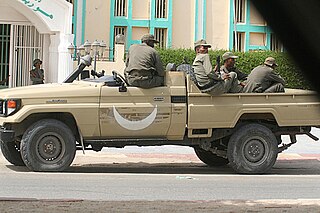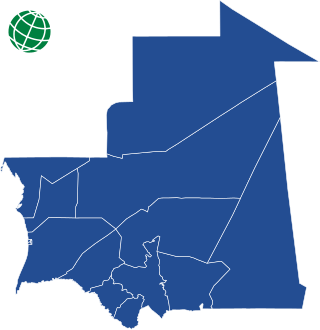The original inhabitants of Mauritania were the Bafour, presumably a Mande ethnic group, connected to the contemporary Arabized minor social group of Imraguen ("fishermen") on the Atlantic coast.

The first fully democratic Presidential election since 1960 occurred on 11 March 2007. The election was the final transfer from military to civilian rule following the military coup in 2005. This was the first time the president was selected by ballot in the country's history. The election was won by Sidi Ould Cheikh Abdallahi, who was ousted by a military coup in 2008 and replaced by general Mohamed Ould Abdel Aziz.

Moktar Ould Daddah was a Mauritanian politician who led the country after it gained its independence from France. Daddah served as the country's first Prime Minister from 1957 to 1961 and as its first President of Mauritania, a position he held from 1960 until he was deposed in a military coup d'etat in 1978.

The Union of the Forces of Progress is a centre-left to left-wing political party in Mauritania.

The National Assembly is the unicameral legislative house of the Parliament of Mauritania. The legislature currently has 176 members, elected for five-year terms in electoral districts or nationwide proportional lists.

The Socialist Democratic Unionist Party is an Arab nationalist political party in Mauritania. As of 2013, the party is led by Mahfouz Weld al-Azizi.

Mauritania – United States relations are bilateral relations between Mauritania and the United States.

The 2008 Mauritanian coup d'état was a military coup that took place in Mauritania on August 6, 2008, when President Sidi Ould Cheikh Abdallahi was ousted from power by the Armed Forces of Mauritania, led by a group of high-ranking generals he had dismissed from office earlier that day.

Mohamed Ould Abdel Aziz is a former Mauritanian politician who was the 8th President of Mauritania, in office from 2009 to 2019. A career soldier and high-ranking officer, he was a leading figure in the August 2005 coup that deposed President Maaouya Ould Sid'Ahmed Taya, and in August 2008 he led another coup, which toppled President Sidi Ould Cheikh Abdallahi. Following the 2008 coup, Abdel Aziz became President of the High Council of State as part of what was described as a political transition leading to a new election. He resigned from that post in April 2009 in order to stand as a candidate in the July 2009 presidential election, which he won. He was sworn in on 5 August 2009. He was subsequently re-elected in 2014, then did not seek re-election in 2019. He was succeeded by Mohamed Ould Ghazouani, who assumed office on 1 August 2019.

Mauritania, officially the Islamic Republic of Mauritania, is a sovereign country in Northwest Africa. It is bordered by the Atlantic Ocean to the west, Western Sahara to the north and northwest, Algeria to the northeast, Mali to the east and southeast, and Senegal to the southwest. Mauritania is the 11th-largest country in Africa and the 28th-largest in the world, and 90% of its territory is situated in the Sahara. Most of its population of 4.4 million lives in the temperate south of the country, with roughly one-third concentrated in the capital and largest city, Nouakchott, located on the Atlantic coast.
Moulaye Ould Mohamed Laghdaf served as the Prime Minister of Mauritania from August 2008 until August 2014.

Presidential elections were held in Mauritania on 18 July 2009. Mohamed Ould Abdel Aziz, who led the 2008 coup d'état, won a narrow first-round majority in the election, according to official results. A second round, if necessary, would have been held on 1 August 2009.

Parliamentary elections were held in Mauritania on 17 May 1959. The result was a victory for the Mauritanian Regroupment Party, which was the only party to contest the elections, thereby winning all 40 seats in the National Assembly. Voter turnout was 90.3%.

General elections were held in Mauritania on 8 August 1971 to elect a President and National Assembly, the first time the two elections had been held together. At the time, the country was a one-party state with the Mauritanian People's Party (PPM) as the sole legal party. Its leader, incumbent President Moktar Ould Daddah, was the only candidate in the presidential election, and was re-elected unopposed to a third term in office, whilst the PPM won all 50 seats in the National Assembly election. Voter turnout for the parliamentary election was reported to be 95.6%.

Presidential elections were held in Mauritania on 8 August 1976, alongside a parliamentary by-election for the new seven seats representing Tiris El Gharbiya, the Mauritanian-occupied area of Western Sahara. At the time, the country was a one-party state with the Mauritanian People's Party (PPM) as the sole legal party. Its leader, incumbent President Moktar Ould Daddah, was the only candidate and was re-elected unopposed. Voter turnout was 97.9%. They were the last elections held until the restoration of multi-party democracy in 1992.

Parliamentary elections were held in Mauritania on 23 November. The opposition has vowed to boycott the election unless the president steps down beforehand. A total of 1,096 candidates have registered to compete for the leadership of 218 local councils across Mauritania, whilst 438 candidates are contesting for the 146 parliamentary seats. Some 1.2 million Mauritanians were eligible to vote in the election. The first round results yielded a landslide victory for the ruling UPR winning 56 seats and their 14 coalition partners winning 34 seats. The Islamist Tewassoul party won 12 seats. The remaining seats were contested in a runoff on 21 December 2013. The UPR won the majority with 75 seats in the Assembly.

The National Rally for Reform and Development, often known by its shortened Arabic name Tewassoul or by the abbreviation of its French name (RNRD), is an Islamist political party in Mauritania. The party is associated with the Mauritanian branch of the Muslim Brotherhood.

The Union for the Republic was a political party in Mauritania. The party was formed in 5 May 2009 by Mohamed Ould Abdel Aziz after he resigned from the military, to run for President of Mauritania. Aziz resigned as chairman of the party on 2 August 2009 after winning the presidential election, as the President of Mauritania cannot be a member of any party. The party also won 13 of the 17 seats up for re-election to the Mauritanian Senate in 2009, giving the UPR control of a total of 38 of the 53 Senate seats.

Parliamentary elections were held in Mauritania on 13 and 27 May 2023, alongside regional and local elections.














